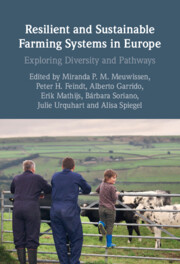15 results
19 - Lessons Learned on Resilience from a Multi-scale Co-creation Methodology
-
-
- Book:
- Resilient and Sustainable Farming Systems in Europe
- Published online:
- 21 April 2022
- Print publication:
- 05 May 2022, pp 321-341
-
- Chapter
-
- You have access
- Open access
- HTML
- Export citation
Preface
-
- Book:
- Resilient and Sustainable Farming Systems in Europe
- Published online:
- 21 April 2022
- Print publication:
- 05 May 2022, pp xxix-xxx
-
- Chapter
-
- You have access
- Open access
- HTML
- Export citation
Contents
-
- Book:
- Resilient and Sustainable Farming Systems in Europe
- Published online:
- 21 April 2022
- Print publication:
- 05 May 2022, pp v-xi
-
- Chapter
-
- You have access
- Open access
- HTML
- Export citation
1 - SURE-Farm Approach to Assess the Resilience of European Farming Systems
-
-
- Book:
- Resilient and Sustainable Farming Systems in Europe
- Published online:
- 21 April 2022
- Print publication:
- 05 May 2022, pp 1-17
-
- Chapter
-
- You have access
- Open access
- HTML
- Export citation
20 - Understanding and Addressing the Resilience Crisis of Europe’s Farming Systems
-
-
- Book:
- Resilient and Sustainable Farming Systems in Europe
- Published online:
- 21 April 2022
- Print publication:
- 05 May 2022, pp 342-374
-
- Chapter
-
- You have access
- Open access
- HTML
- Export citation
Copyright page
-
- Book:
- Resilient and Sustainable Farming Systems in Europe
- Published online:
- 21 April 2022
- Print publication:
- 05 May 2022, pp iv-iv
-
- Chapter
-
- You have access
- Open access
- HTML
- Export citation
Index
-
- Book:
- Resilient and Sustainable Farming Systems in Europe
- Published online:
- 21 April 2022
- Print publication:
- 05 May 2022, pp 375-394
-
- Chapter
-
- You have access
- Open access
- HTML
- Export citation
Figures
-
- Book:
- Resilient and Sustainable Farming Systems in Europe
- Published online:
- 21 April 2022
- Print publication:
- 05 May 2022, pp xii-xiv
-
- Chapter
-
- You have access
- Open access
- HTML
- Export citation
Acknowledgements
-
- Book:
- Resilient and Sustainable Farming Systems in Europe
- Published online:
- 21 April 2022
- Print publication:
- 05 May 2022, pp xxxi-xxxii
-
- Chapter
-
- You have access
- Open access
- HTML
- Export citation
12 - Realising Transformation in Response to Future Challenges
-
-
- Book:
- Resilient and Sustainable Farming Systems in Europe
- Published online:
- 21 April 2022
- Print publication:
- 05 May 2022, pp 201-214
-
- Chapter
-
- You have access
- Open access
- HTML
- Export citation
Tables
-
- Book:
- Resilient and Sustainable Farming Systems in Europe
- Published online:
- 21 April 2022
- Print publication:
- 05 May 2022, pp xv-xvi
-
- Chapter
-
- You have access
- Open access
- HTML
- Export citation
2 - The Importance of Improving and Enlarging the Scope of Risk Management to Enhance Resilience in European Agriculture
-
-
- Book:
- Resilient and Sustainable Farming Systems in Europe
- Published online:
- 21 April 2022
- Print publication:
- 05 May 2022, pp 18-37
-
- Chapter
-
- You have access
- Open access
- HTML
- Export citation
Contributors
-
- Book:
- Resilient and Sustainable Farming Systems in Europe
- Published online:
- 21 April 2022
- Print publication:
- 05 May 2022, pp xvii-xxviii
-
- Chapter
-
- You have access
- Open access
- HTML
- Export citation
18 - A Resilience-Enabling Environment for Farming Systems
-
-
- Book:
- Resilient and Sustainable Farming Systems in Europe
- Published online:
- 21 April 2022
- Print publication:
- 05 May 2022, pp 302-320
-
- Chapter
-
- You have access
- Open access
- HTML
- Export citation

Resilient and Sustainable Farming Systems in Europe
- Exploring Diversity and Pathways
-
- Published online:
- 21 April 2022
- Print publication:
- 05 May 2022
-
- Book
-
- You have access
- Open access
- Export citation



